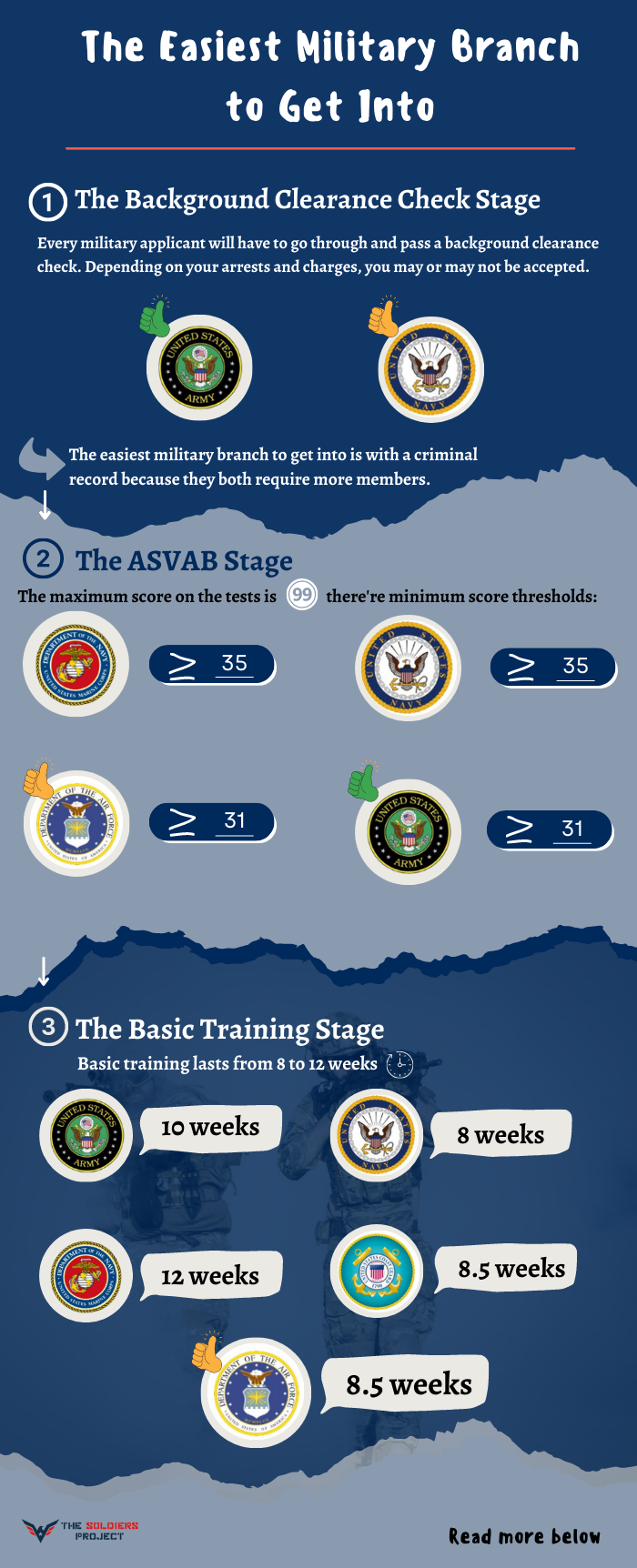
When contemplating a military career, prospective recruits often find themselves intrigued by the varying degrees of rigorousness associated with basic training across different branches. This begs the question: which military branch claims the title for the easiest boot camp? Understanding the nuances of each branch’s basic training can significantly influence one’s decision to enlist, particularly for those who may feel daunted by the thought of military life. The following examination seeks to elucidate the comparative ease or challenge presented by the basic training of the Army, Navy, Air Force, Marine Corps, and Coast Guard.
1. Overview of Military Branches
Each military branch in the United States is distinct, tailored to fulfill specific roles and missions. The Army serves as the land warfare component; the Navy excels in naval operations; the Marine Corps is revered for its rapid response capabilities; the Air Force dominates aerial missions; and the Coast Guard ensures maritime safety and security. This distinction is pivotal as it lays the groundwork for baseline philosophies that drive the training regimens.
2. Fundamental Differences in Training Philosophies
The crux of each branch’s basic training is often reflective of its overarching mission. The Army, known for its extensive ground operations, emphasizes resilience and adaptability, forging soldiers who can endure grueling conditions. Conversely, the Navy puts a premium on teamwork and technical proficiency, molding sailors adept in navigating complex maritime scenarios. The Marine Corps, with its storied reputation, instills a culture steeped in discipline and rapid mobilization, while the Air Force focuses on technical expertise and aerial maneuverability. The Coast Guard, though smaller, imbues a sense of duty and law enforcement into its recruits.
3. Air Force Basic Military Training (BMT)
The Air Force is often heralded as having one of the least strenuous boot camps. Spanning approximately eight and a half weeks, Recruit Training at Lackland Air Force Base in Texas places considerable emphasis on discipline imbued with a supportive environment. Recruits engage in physical training, yet the intensity does not rival that of the other branches. The emphasis lies on forming technical skills essential for operational readiness, with a significant segment dedicated to academic coursework and leadership development.
4. Navy Boot Camp
Navy Boot Camp, conducted at Great Lakes Naval Training Station in Illinois, lasts approximately eight weeks. Though it includes rigorous physical training akin to that of other branches, it notably prioritizes functionality in team settings. Recruits learn essential nautical skills and undergo swim qualifications, introducing a unique layer of difficulty tailored to naval operations. While the physical demands are moderate, the environment fosters camaraderie and encourages collective problem-solving, which can be less daunting than the solitary challenges faced in other branches.
5. Coast Guard Basic Training
Coast Guard boot camp shares similarities with Navy training duration, spanning approximately eight weeks. It is distinctive in that it combines foundational military instruction with a pronounced focus on search and rescue operations. The environment encourages resilience through challenging physical conditioning, yet it retains a comparatively level-headed approach, focusing more on practical skills that reflect everyday Coast Guard operations. As such, for those who may thrive in a supportive learning environment, this branch offers a compelling case.
6. Army Basic Combat Training (BCT)
Army Basic Combat Training stands out for its rigorous demands, lasting approximately 10 weeks. This culmination of physical endurance, tactical training, and weapon proficiency presents a heightened challenge compared to the Air Force and Navy. The Army fosters a culture of resilience and grit, pushing recruits to overcome both physical and mental hurdles. The experience is designed to emulate real-world combat scenarios, which can feel overwhelmingly intense for many recruits.
7. Marine Corps Recruit Training
Widely regarded as the most demanding basic training, Marine Corps Recruit Training extends for 13 weeks. The program is renowned for its intensity and psychological challenges, with a strong emphasis on discipline and an enduring spirit of camaraderie among recruits. The Marine Corps trains individuals to surpass their limits, instilling a unique mindset that is not solely about physical prowess but also about mental fortitude. For many, this formidable experience shapes lifelong character traits.
8. Comparative Analysis
When synthesizing the attributes of each branch’s training program, it is evident that the Air Force, Navy, and Coast Guard stand out for their comparatively less strenuous boot camps. The emphasis for these branches leans towards technical acumen, teamwork, and versatility rather than sheer physical exhaustion. Conversely, the Army and Marine Corps present a starkly different paradigm, prioritizing grit and intensive physical training. For those seeking to embark on a military journey with an eye towards mitigating potential adversity, the Air Force provides the most approachable initiation, followed closely by the Navy and Coast Guard.
9. Conclusion
In contemplating which military branch offers the least strenuous basic training, it becomes clear that personal attributes, career aspirations, and individual tolerances to challenge play an instrumental role. While the Air Force emerges as the most accessible option, aspiring recruits must consider their long-term goals and the unique demands of each branch. Ultimately, the decision transcends mere training difficulty; it embodies a commitment to service that aligns with one’s values and aspirations for personal growth.
